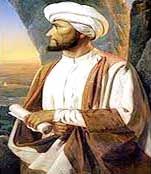Ibn Battuta-Brief Life Sketch
Ibn Battuta
Ibn Battuta-Brief Life Sketch
Ibn Battuta was a traveller of middle age from Morocco. He was born on February 24, 1304, in Tangier, Morocco. He studied literature and law in Tangier, and at the age of 21 he became interested in travelling and he travelled around the world for a long period of about 30 years. In his long journey, Ibn Battuta travelled about 120,000 kilometres to Egypt, Makka, Arabia, Iraq, Iran, Azerbaijan, India, Spain, China, Baghdad and other places. He came to India during the reign of Muhammad bin Tuglak in 1333 and stayed in India till 1353. During his stay in India, he also served as the Chief Justice of Delhi from 1334 to 1342. Ibn Batuta, popularly known as the ‘Traveller of Islam’, returned to his native Morocco in 1354.
The main purpose of Ibn Battuta’s world tour was to learn about new countries and people. He wrote a valuable book called ‘Rehwala’ based on his experience of travelling to different countries. His travel book has now been translated into many languages. Ibn Batuta died in 1368 AD in his birthplace Tangier. 0 0 0
N.B. The article ‘Ibn Battuta-Brief Life Sketch’ originally belongs to the book ‘Introduction to World Personalities‘ by Menonim Menonimus.
Books of Composition by M. Menonimus:
- Advertisement Writing
- Amplification Writing
- Note Making
- Paragraph Writing
- Notice Writing
- Passage Comprehension
- The Art of Poster Writing
- The Art of Letter Writing
- Report Writing
- Story Writing
- Substance Writing
- School Essays Part-I
- School Essays Part-II
- School English Grammar Part-I
- School English Grammar Part-II..
Books of S. Story by M. Menonimus:
Books of Biography by M. Menonimus:
- The World Writers-Brief Biographies
- Introduction to World Writers
- Introduction to World Personalities
- Love of Reputed Persons ..
Related Search:








